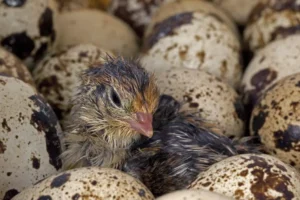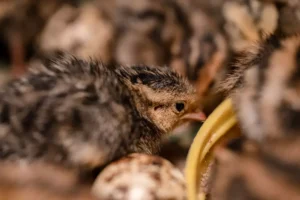When it comes to quail chicks, proper care is essential for their health and development.
Here are some tips on how to care for quail chicks:
- Provide a clean and warm brooder. The brooder should be large enough for the chicks to move around freely, with plenty of ventilation.
- A heat lamp can be used to provide warmth, but make sure that the temperature is not too hot or cold.
- Give them access to fresh water and food at all times. Quail chicks need a high protein diet, so offer them a quality chick starter feed.
- Keep the brooder clean and free of debris. Regularly check for signs of disease or parasites, and seek veterinary advice if necessary.

How Do You Keep Quail Chicks Alive?
Quail chicks are delicate and require special care to ensure their survival. The first step is to purchase healthy chicks from a reputable breeder. Once you have your chicks, they need to be kept warm, fed properly, and given clean water.
Chicks must be kept warm or they will die. A good way to do this is to use a brooder. A brooder is a heated enclosure that can be purchased or made at home.
The temperature inside the brooder should be between 95-100 degrees Fahrenheit for the first week of the chick’s life, and then can be slowly decreased by 5 degrees each week until it reaches 70 degrees Fahrenheit (21.11 °C).
Chicks also need access to fresh air, so the brooder should have ventilation holes. Chicks need to eat often and have access to clean water at all times.
They should be given a high-quality chick starter feed that has been medicated with amprolium to prevent coccidiosis (a common disease in young birds).
The feeders and waterers should be cleaned daily and changed as needed so that the chicks always have fresh food and water available. As long as these basic needs are met, your quail chicks should survive and thrive!
How Long Do Baby Quail Need a Heat Lamp?
Most baby quail need a heat lamp for the first 4-6 weeks of their lives. After that, they can be slowly transitioned to living without a heat lamp.

What Do Newborn Quail Eat?
When it comes to what newborn quail eat, there is a bit of variation among the different species. However, in general, they will feed on insects and other small invertebrates.
This is why it is important to provide them with a source of these foods, either through your own yard or by purchasing them from a pet store.
In addition to this, you can also give them some grit, which will help with their digestion.
What Do You Need for Quail Chicks?
You will need the following things for your quail chicks:
- A brooder: This is a heated enclosure that will keep your chicks warm and safe. You can buy a commercial brooder, or make your own using a cardboard box lined with newspapers and a heat lamp.
- Chicks: You will need to purchase quail chicks from a hatchery or breeder. Make sure to get them before they are more than two weeks old, as older chicks may have difficulty adjusting to their new home.
- Quail feed and water containers: These can be purchased at your local pet store, or online. Make sure the containers are big enough for the number of chicks you have, and that they have smooth edges so the chicks cannot hurt themselves on them.
- Quail feeders and waterers should be placed in the brooder, so the chicks can easily access them. The feeders should be filled with a good quality chick starter feed, and the waterers should always have fresh, clean water available.
How to Care for Quail Chicks?
What to Feed Quail Chicks?
When it comes to feeding quail chicks, there are a few things you need to keep in mind. Firstly, you need to make sure that they have access to fresh water at all times.
Secondly, you need to provide them with a high-quality chick starter feed.
This should be finely ground and free of any large pieces that could choke the chicks. As the chicks grow, you can slowly start introducing them to other foods such as chopped vegetables, fruits, and even some cooked rice or pasta.
However, it’s important not to make any sudden changes to their diet as this can cause digestive issues. Always introduce new foods slowly and in small quantities at first.
If you’re unsure about what type of food to buy for your quail chicks, then ask your local pet store or veterinarian for advice.
They will be able to point you in the right direction and help ensure that your chicks are getting everything they need to grow up healthy and strong!
Conclusion
If you’re thinking about adding quail to your backyard flock, you need to know how to care for quail chicks.
These little birds require some special care and attention, but they’re well worth the effort. Here are a few tips to help you get started.
First, you’ll need to set up a brooder for your quail chicks. This can be as simple as a cardboard box with a heat lamp, or you can purchase a commercial brooder.
Either way, make sure the brooder is big enough for the chicks to move around freely and has plenty of ventilation.
Next, it’s important to keep your quail chicks warm. They should be kept at a temperature between 95-100 degrees Fahrenheit for the first week or so of life.
After that, you can slowly start lowering the temperature by 5 degrees each week until they’re able to tolerate room temperature (around 70 degrees).
Use a thermometer placed in the brooder so that you can monitor the temperature closely. Third, provide your quail chicks with fresh water and food at all times.
They will need a high protein diet consisting of either commercial chick feed or chopped hard-boiled eggs mixed with grit (a finely ground rock that helps them digest their food properly).
Be sure to change their water frequently and keep an eye on their food consumption – if they seem like they’re eating less than normal, raise the temperature in their brooder slightly, as this may mean they’re cold.
Caring for quail chicks isn’t difficult, but it does require some time and attention. By following these simple tips, you’ll be well on your way to raising healthy and happy quails!